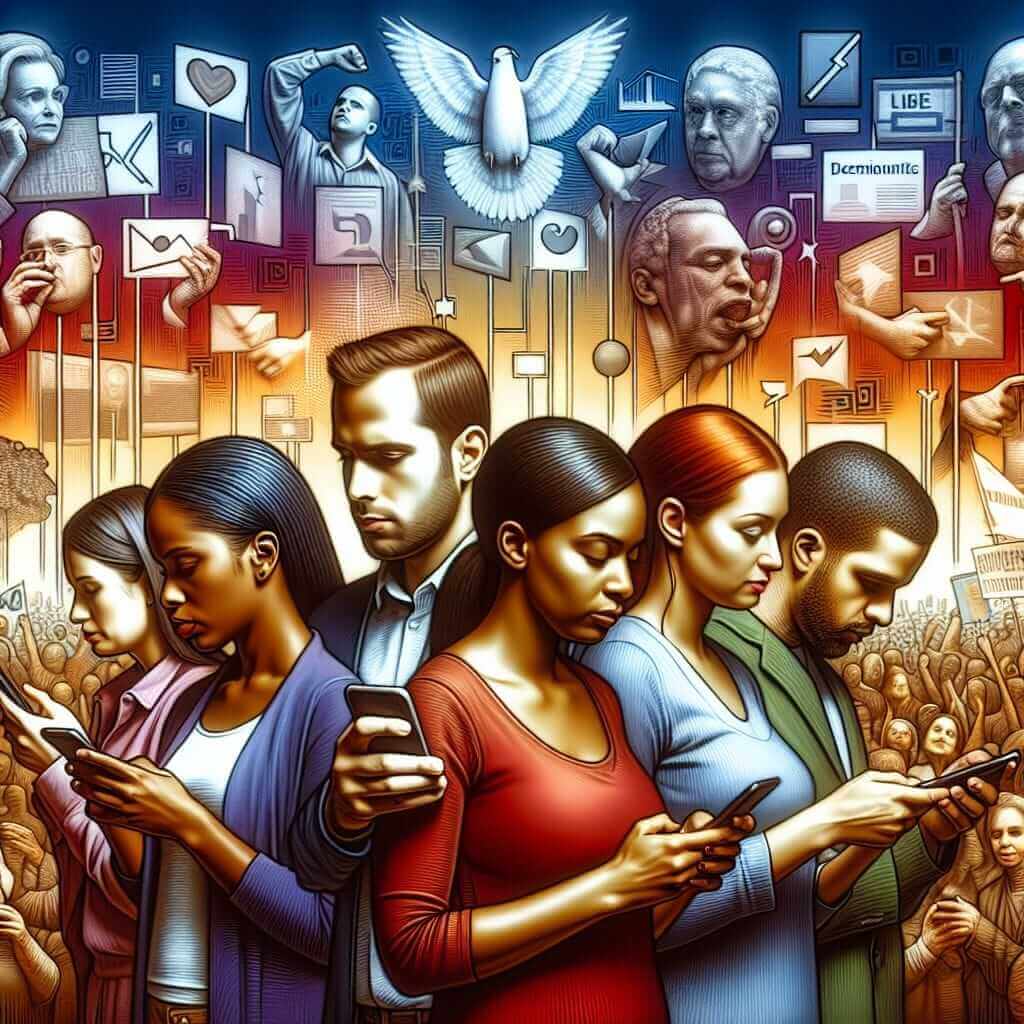The pervasive influence of social media on public opinion during elections is undeniable. It’s a topic frequently appearing in IELTS Writing Task 2, often framed as a double-edged sword, prompting candidates to grapple with both opportunities and challenges. This essay explores the multifaceted nature of social media’s impact on elections, analyzing its potential to both enhance and undermine democratic processes.
Understanding the Topic
Examining how social media influences public opinion during elections is crucial in today’s digital age. This topic often features in IELTS Writing Task 2, prompting test-takers to analyze its complexities.
Common IELTS Essay Prompts
Here are some IELTS essay prompts related to this topic:
- To what extent do you agree that social media has a positive impact on the political decision-making process of voters? (Opinion Essay)
- Discuss the advantages and disadvantages of using social media platforms for political campaigns. (Discussion Essay)
- Analyze the influence of social media on public opinion during elections and its implications for democracy. (Analysis Essay)
The frequency of these prompts highlights the significance of this issue in contemporary society.
Sample Essay: The Double-Edged Sword of Social Media in Elections
Analyzing the Prompt
Let’s delve into an opinion essay prompt:
“Social media is increasingly used by political parties during election campaigns. To what extent do you agree that social media has a positive impact on the political decision-making process of voters?”
This prompt requires us to assess the positive aspects of social media’s influence on voters’ political decision-making.
Model Essay
In today’s digital age, social media has become an indispensable tool for political parties to engage with voters during election campaigns. While some argue that this trend has detrimental effects on the political decision-making process, I firmly believe that social media, when used responsibly, can significantly enhance it.
One compelling argument in favor of social media’s positive influence is its ability to empower voters with information. Unlike traditional media, which often acts as a gatekeeper of information, social media platforms provide a direct channel for political parties to communicate their policies, ideologies, and campaign promises to the electorate. This unfiltered access to information empowers voters to make informed decisions based on a broader range of perspectives.
Furthermore, social media platforms facilitate increased political participation and engagement. Through social media, citizens can engage in political discourse, share their views, and hold their elected representatives accountable. Online forums, discussion groups, and social media campaigns provide avenues for citizens to voice their concerns, participate in debates, and mobilize support for causes they believe in. This heightened level of engagement fosters a sense of ownership and responsibility among voters, leading to a more informed and participatory democracy.
However, it is essential to acknowledge the potential downsides of social media’s influence on political decision-making. The spread of misinformation and the creation of echo chambers are serious concerns. Biased algorithms and the viral nature of social media content can create filter bubbles, exposing users only to information that confirms their existing biases. This can lead to polarization and hinder constructive dialogue.
Despite these challenges, the positive impacts of social media on political decision-making outweigh the negatives. By promoting transparency, accountability, and citizen engagement, social media has the potential to strengthen democratic processes. However, it is crucial for both political actors and citizens to use these platforms responsibly, critically evaluating information and engaging in respectful discourse.
In conclusion, while acknowledging the potential risks, I firmly believe that social media, when used ethically and responsibly, has a positive impact on the political decision-making process of voters. By empowering citizens with information, facilitating engagement, and fostering transparency, social media can contribute to a more informed and participatory democracy.
(Word count: 319 words)
Writing Tips
- Structure: Follow a clear essay structure (introduction, body paragraphs, conclusion) with a balanced perspective.
- Vocabulary: Use topic-specific vocabulary (e.g., electorate, political discourse, misinformation, echo chambers, filter bubbles).
- Grammar: Employ a variety of sentence structures and grammatical constructions accurately.
- Examples: Support your arguments with relevant examples to illustrate your points.
Key Vocabulary
- Electorate (noun): The body of people entitled to vote in an election.
- Political discourse (noun): Communication, written or spoken, concerning political issues.
- Misinformation (noun): False or inaccurate information, especially that which is deliberately intended to deceive.
- Echo chamber (noun): An environment where a person only encounters information or opinions that reflect and reinforce their own.
- Filter bubble (noun): A state of intellectual isolation that can result from personalized searches when a website algorithm selectively guesses what information a user would like to see based on information about the user.

Conclusion
The influence of social media on public opinion during elections is a complex and multifaceted phenomenon. It’s essential to approach this topic with a nuanced perspective, acknowledging both its potential benefits and drawbacks.
Exploring related themes like the role of traditional media, the impact of fake news, and the ethical considerations surrounding online political campaigning can further enhance your understanding. By staying informed and critically evaluating information, we can harness the power of social media for a more informed and participatory democracy.